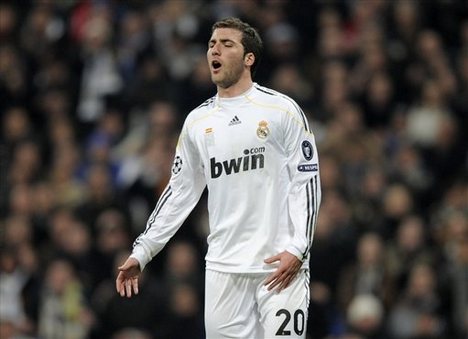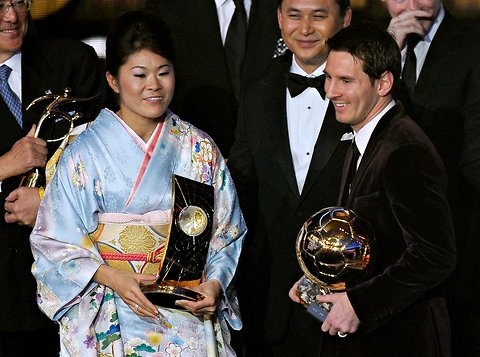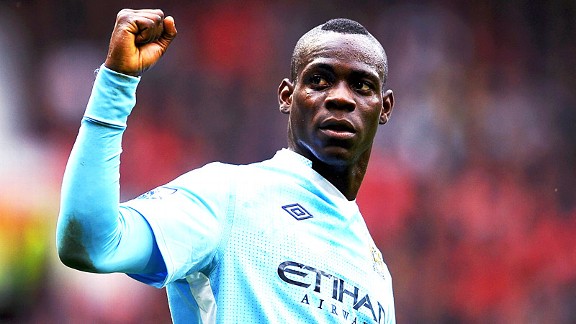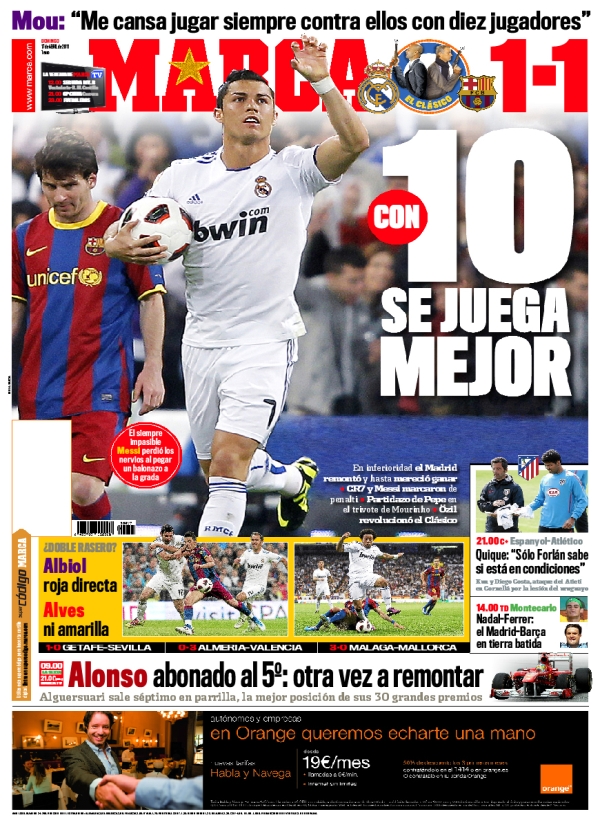What started off el clásico predictable turned into a wide-open and exciting affair. Though they were the losing side, Madrid's performance is sure to embolden them on their league return to the Camp Nou.
main
AsiaCommentaryNews
Sawa Snaps Marta’s Ballon d’Or Streak
If history is anything to go by, expect 2011 Women’s World Cup winner Homare Sawa to be collecting her second Ballon d’Or prize this time next year. At the World Cup, Sawa also won the tournament best player and top scorer trophies.
Marta had won five years running as the top female player in the world, but no more. At least not for now. (The Brazilian is considered the best female player ever, after all.)
Japanese midfielder Sawa is only the fourth woman to win the award, inaugurated in 2001, because curiously no woman has never won simply once, not to mention consecutively.
Mia Hamm won the first two, in 2001 and 2002. Germany’s Birgit Prinz then carried home three between 2003 and 2005, before Marta’s five brought us to the current day.
Marta and American striker Abby Wambach were the other two finalists for the award.
Oh yeah, and Messi won his third. In a row.
Commentary
Player(s) for the Uninitiated American Sports Fan?
We’ve got a good friend who’s a big sports fan, but mostly of the traditional American variety: primarily basketball and football, both college and pro.
We asked him if he’d ever thought about watching some soccer, and he said what it would take would be a compelling player for him to follow.
Which obviously got us thinking which one(s) we’re going to pick for him to watch.
Here are our preliminary picks–one obvious choice, one a bit less so, and one American:
1) Lionel Messi
2) Mario Balotelli
3) Clint Dempsey (Not only is our friend American, but he’s got an affinity for Texas–the teams he follows most closely are the Dallas Cowboys and UT football. Also the Lakers.)
We’ll be back with a followup post giving some context as to why these three, including some links to background articles and YouTube clips–not least for the friend in question. But we also welcome additional suggestions and/or feedback on these choices. Hit us up on Twitter or Facebook.
CommentaryVideo
202 Messi Goals–Video
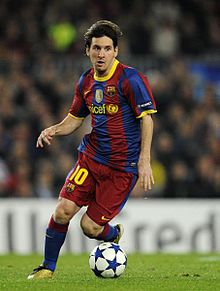
Pelé, in a recent interview, called Lionel Messi the best of the current generation, but saved the ultimate all-time-best plaudits for himself, referring to himself in the third person throughout (naturally). The royal we, we were amused.
Question: The musical accompaniment, does it drive you crazy or not? Discuss.
I recently checked myself into a piano trauma hospital. I’m not saying there’s a direct causal connection. Except I am.
CommentaryHistoryNews
Marca on Madrid: “Con 10 Se Juega Mejor”
We’ve been digesting Saturday’s Real Madrid-Barcelona 1-1 draw at the Bernabeu–just the first installment of this month’s 4-part El Clásico series; the second is coming up this Wednesday with the Copa del Rey final, to be contested on neutral turf–at the Mestalla in Valencia. In the meantime, it’s always entertaining to see how Madridista tabloid Marca spins the latest big result.
There’s much to savor in this cover. The screaming lead (“Con 10 se juega mejor”) seems pedestrian enough. Translating to “It’s better to play with 10” (or “We play better with 10”?), Marca is seemingly remarking simply that Madrid played better after losing Albiol to a red card and playing a man short for the final 40 minutes of the match.
But it turns out the headline may actually be an allusion to an aphorism attributed to the legendary manager Helenio Herrera–which leads to something of a Möbius strip of historical resonances: Herrera, nicknamed Il Mago (“The Wizard”), is best known for managing Barcelona (1958-1960) and subsequently Inter Milan (1960-1968). His Barcelona sides successfully challenged the 5-time European champions Real Madrid on the domestic front. Then in Milan he gave birth to Catenaccio and led “La Grande Inter” to two consecutive European championships (1964 and 1965). Inter didn’t conquer Europe again until last year–led by Jose Mourinho of course, defeating Barcelona along the way in the semifinal, which led to headlines such as “In José Mourinho Inter finally have a true heir to Helenio Herrera.”
(For more on Herrera, confer this post on The Equaliser (which also has a post about La Grande Inter); Chapter 9 of Simon Kuper’s Soccer Against The World, titled “A Day with Helenio Herrera”; the chapter of Jimmy Burns’s Barça: A People’s Passion covering Herrera’s tenure at Barcelona, titled “El Salvador”; or this post titled “The Really Special One – Helenio Herrera.”)
Back to the Marca cover: Mou(rinho)’s comment on the matter gets put across the top (“Me cansa jugar siempre contra ellos con diez jugadores” / “I am tired of always playing against them with 10 players”), and Marca asks whether the “roja directo” (straight red) for Albiol versus no yellow (“ni amarilla”) for Alves on the respective penalties represents a double standard (“¿doble rasero?”).
Of course it’s CR7 and Messi that dominate the image–another fine piece of photoshopping. Ronaldo striding with the ball, looking up, clawing at the air like some sort of big cat (perhaps an allusion to Mourinho’s hunting with cats?), while Messi shuffles behind him, eyeing the ball, looking disturbed/disturbing.
But we also rather like the little image of Guardiola and Mourinho inserted at the top: the two managers with their backs to each other, pistols in hand. One round of the duel completed–three more to go.
Video
FIFA Club World Cup 2009: FC Barcelona 2 – 1 Estudiantes (ARG)
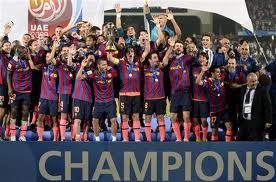
As part of the run up to tomorrow’s FIFA Club World Cup 2010 championship game (between 2009-10 UEFA Champions League winner Inter Milan and 2010 AFC Champions League winner TP Mazembe), we take a look back at the finale of last year’s tournament, between FC Barcelona (who qualified by winning the 2008-09 UEFA Champions League) and Estudiantes de la Plata (also known, apparently, as Los Pincharratas–The Rat Stabbers, and who had won the 2009 Copa Libertadores).
(Fox Deportes is actually going to rebroadcast the Barcelona-Estudiantes game this afternoon at 5pmET–ahead of their broadcast of Inter-TP Mazembe tomorrow at 12pmET. But if you don’t get to watch the rebroadcast, see below for a 6min highlight clip.)
It was a rather exciting game, as Estudiantes took the lead in the 37th minute off a fantastic header by Mauro Boselli. But Pedro pulled Barcelona even in the 89th minute–Pique had moved up into attack, and won a head ball that Pedro nicely finished, also with his head. And then Messi, as he tends to do, scored with spectacular fashion and timing–somehow getting behind Estudiantes’ defenders and headed in the winning goal with 10 minutes remaining in extra time.
Barcelona became the first Spanish club to win the FIFA Club World Cup, and it also completed Barcelona’s remarkable and unprecedented 2009 sextuple: 2008–09 La Liga, 2008–09 Copa del Rey, 2009 Supercopa de España, 2008–09 UEFA Champions League, 2009 UEFA Super Cup, and the 2009 FIFA Club World Cup.
Here’s the video:
CommentaryNewsPreview
El Clásico TODAY!
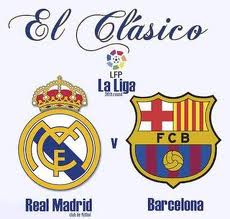 The game we’ve all been waiting for kicks off in just over an hour (3pm ET, 9pm local time–at the Camp Nou). El derbi español, “más conocido como El Clásico“–Barcelona vs Real Madrid, which also means: Catalans vs Castilians, L’Equip Blaugrana vs Los Blancos, La Masia vs Los Galacticos, Los Cules vs Los Madridistas, regionalism vs centralism, Cryuff vs Franco, Guardiola vs Mourinho, Messi vs Ronaldo.
The game we’ve all been waiting for kicks off in just over an hour (3pm ET, 9pm local time–at the Camp Nou). El derbi español, “más conocido como El Clásico“–Barcelona vs Real Madrid, which also means: Catalans vs Castilians, L’Equip Blaugrana vs Los Blancos, La Masia vs Los Galacticos, Los Cules vs Los Madridistas, regionalism vs centralism, Cryuff vs Franco, Guardiola vs Mourinho, Messi vs Ronaldo.
It’s no wonder that Sid Lowe saw the need to talk us down from all the El Clásico hype–before talking it up:
Contrary to what you might have heard, the world will not end on Monday night. The sun will rise on Tuesday morning. And there is life beyond the clásico. It’s just that right now, it doesn’t feel like it — it feels like nothing else matters, like no other games exist, like no other teams do. Every year Barcelona versus Madrid, already the biggest club game in world soccer, seems to get bigger. Even the old title seems worthless now. Derby? No thanks, this is the clásico. It’s even moved on from that. Now it’s the Super Clásico. Carry on like this and soon we’ll run out of superlatives.
And it’s certainly superlative. It’s almost ridiculous….Whichever way you look at it, this is probably the most extraordinary club match there has ever been. Until the next time, at least.
In terms of talent per square meter, you could argue that there has never been a game like it. It is possible that no two teams have ever dominated the planet’s talent like Barcelona and Madrid do now.
To get a better idea of how all that talent will matchup on the field today, take a look at this, which lists five key matchups to watch (1. Carles Puyol/Daniel Alves vs Cristiano Ronaldo/Ángel Di Maria; 2. Javier Mascherano or Sergio Busquets vs Mesut Ozil; 3. Ricardo Carvalho/Pepe versus David Villa; 4. Sami Khedira vs Xavi Hernández; 5. José Mourinho vs Pep Guardiola); or this, which gives a longer and largely different list of matchups–but closes with the same managerial matchup:
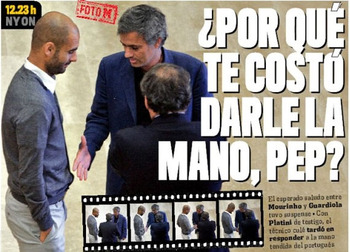
José Mourinho vs. Pep Guardiola from the sidelines, in the locker rooms, in front of the press, and on the training pitch. The Special One is the best in the world outside of Pep or Sir Alex at this point in time. But, it’s hard to pick a clear favorite here being that Mourinho won a Treble last year, while Guardiola won six trophies the season before. Last year, Mourinho won-out eliminating Barcelona from the Champions League. Has Guardiola learned from that lesson? I think he has. However, I see this coaching-bout being a draw between Emperor Mourinho Palpatine and Pep Skywalker Guardiola.
That latter preview also mentions each side’s most-used formations (4-2-3-1 for Real Madrid, 4-3-3 for Barcelona’sand For more on tactics, see Zonal Marking’s detailed tactical preview, which includes the probable starting lineups shown below. For squad statistics, play around with Marca.com’s nice interactive graphic.
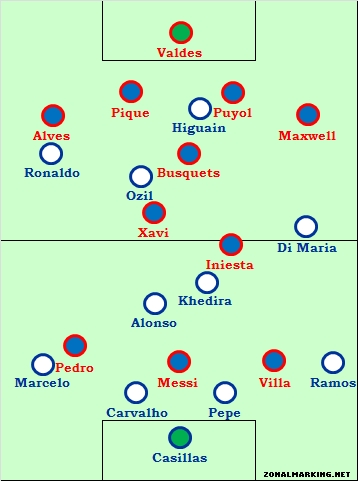
And for an idea of the historical context surrounding El Clásico, take a look at this column from 2002 by Phil Ball (who wrote Morbo: The Story of Spanish Football):
Not only is the dislike between the two clubs an interesting phenomenon in sporting terms, it also has implications that stray deeply into the sociology and politics of the country. It might not be going too far to say that the strife and struggles between the two clubs from 1905 onwards accurately mirror the very essence of twentieth-century Spanish history. The two cities have always been moving in different directions, partly through bloody-mindedness, partly through political allegiance, but mainly through clear cultural differences.
A supporter of Real Madrid seems a very distinct creature from a supporter of Barcelona, a fact that cannot be attributed wholly to the fact that they probably talk about football in a different language. Madrid is a bourgeois, grand, rather suffocating sort of city on first acquaintance. The surrounding countryside is bleak and bare, – suggestive of some harshness in the citizens. To an outsider it is not a welcoming city – its taxi drivers grumpy and sullen, its waiters coldly efficient, its shops too self-consciously trendy. Madrid was built on and is sustained by the notion of centralisation – in this century exemplified by Franco’s obsessive opposition to regional nationalism, which he regarded as one of the principal reasons for the turmoil of Spain’s ill-fated second republic.
Madrid was symbolically in the geographical centre of the country, put there by Felipe II in the mid-sixteenth century. It is part and parcel of the Madrid-Barcelona morbo that the latter seems to inhabit a different planet. Despite the fact that Madrid has the Prado, the seat of government and the royal family, according to John Hopper’s book The New Spaniards almost all the ideas that have shaped Spain’s modern history – republicanism, federalism, anarchism, syndicalism and communism – have found their way into Spain by way of Catalonia.
News
Shortlists for FIFA Balon d’Or 2010
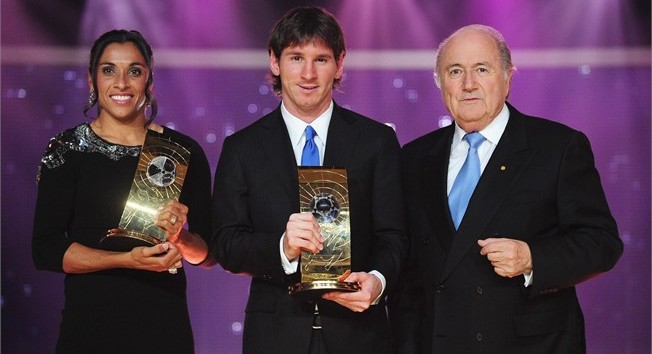
Via FIFA.com:
The following 23 men (in alphabetical order) are in contention for the FIFA Ballon d’Or 2010:
Xabi Alonso (Spain), Daniel Alves (Brazil), Iker Casillas (Spain), Cristiano Ronaldo (Portugal), Didier Drogba (Côte d’Ivoire), Samuel Eto’o (Cameroon), Cesc Fabregas (Spain), Diego Forlán (Uruguay), Asamoah Gyan (Ghana), Andrés Iniesta (Spain), Júlio César (Brazil), Miroslav Klose (Germany), Philipp Lahm (Germany), Maicon (Brazil), Lionel Messi (Argentina), Thomas Müller (Germany), Mesut Özil (Germany), Carles Puyol (Spain), Arjen Robben (Netherlands), Bastian Schweinsteiger (Germany), Wesley Sneijder (Netherlands), David Villa (Spain) and Xavi (Spain).
The odd man in there seems to Asamoah Gyan. Don’t get us wrong, we were impressed by Baby Jet performances this summer in Africa (this one against the USMNT in the World Cup of course–but also this more recent performance)–but he hasn’t accomplished what the other players on the list have. (Özil and Müller are two even younger players that one might argue about–but those two have already impressed and achieved more for both club and country than Gyan has.)
There’s more to the Balon d’Or than just the men’s player award however. The shortlists for the other three categories:

